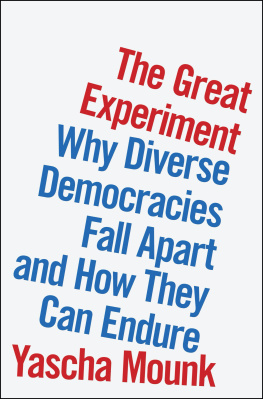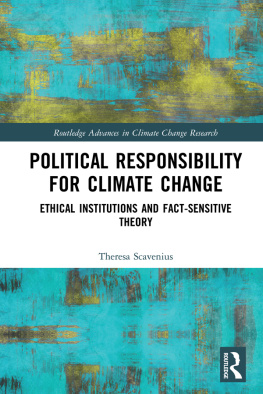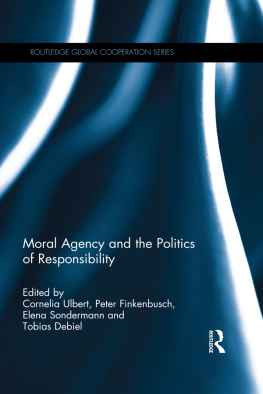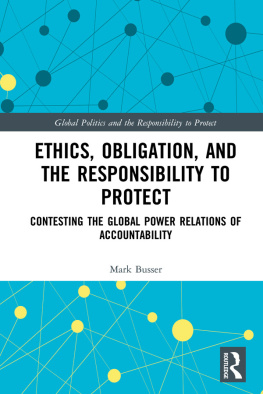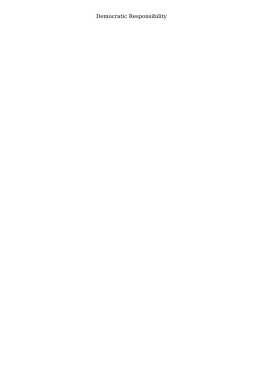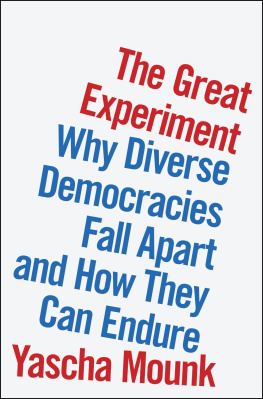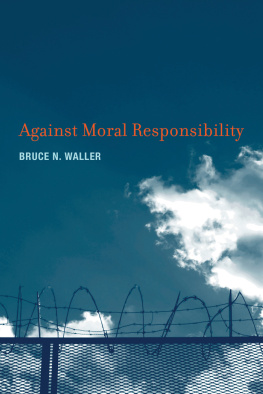THE AGE OF RESPONSIBILITY
Luck, Choice, and the Welfare State
YASCHA MOUNK


Cambridge, Massachusetts
London, England
2017
Copyright 2017 by Yascha Mounk
All rights reserved
Jacket image: WITHFLOOR/Getty Images
Jacket design: Graciela Galup
978-0-674-54546-5 (hardcover)
978-0-674-97829-4 (EPUB)
978-0-674-97827-0 (MOBI)
978-0-674-97825-6 (PDF)
The Library of Congress has cataloged the printed edition as follows:
Names: Mounk, Yascha, 1982 author.
Title: The Age of Responsibility : luck, choice, and the welfare state / Yascha Mounk.
Description: Cambridge, Massachusetts : Harvard University Press, 2017. | Includes bibliographical references and index.
Identifiers: LCCN 2016048373
Subjects: LCSH: ResponsibilityPolitical aspects. | ResponsibilitySocial aspects. | Autarchy. | Welfare state. | Welfare economics.
Classification: LCC BJ1451 .M68 2017 | DDC 361.6/5dc23
LC record available at https://lccn.loc.gov/2016048373
To Ala
Contents
Personal responsibility is a peculiar phrase: at once anodyne and foreboding, it is both an expression of breezy common sense and a barely concealed threat to those unfortunate souls who might be so foolish as to insist on acting irresponsibly. Especially popular in campaign slogans, commencement speeches, and self-help books, it would be tempting to dismiss personal responsibility as an empty incantation that was never meant to convey any real meaningwhat the common law, in one of its more charming inventions, calls mere puffery.
Much of the time, invocations of responsibility really are an anodyne way to name-check the virtues every decent citizen can rally around: love and lemonade, patriotism and pancakes, personal responsibility and apple pie. But though the language of responsibility is now such a routine part of Americanand indeed Europeanpublic life that the literal meanings of the words which are uttered barely register, the impact of responsibilitys rise has been real. Rhetoric about personal responsibility has not just made itself at home in our advice columns, our campaign slogans, and our political language. The turn to responsibility has dominated the philosophical debates of the last half century, taken a deep hold of our moral imagination, and even transformed the nature of our welfare states.
That is all the more remarkable since the centrality of responsibility to our politics and philosophy is a comparatively recent phenomenon. Throughout much of the postwar era, most philosophers, social scientists, and politicians thought that a focus on the personal responsibility of individuals was, at best, a distraction. In their minds, it was larger structural and normative questions that really mattered. What distribution of economic resources should we aim for? What influence do a mothers class, race, and geographic location have on the prospects of her children? And what duties does the state have toward the destitute, irrespective of the reasons for their misfortune? Insofar as they talked about responsibility at all, they usually meant not the responsibility that each person has to be self-sufficient but rather the responsibility we all have to help our fellow citizens.
The shift from an emphasis on structural, society-level considerations to an emphasis on the individual and his or her responsibilities took place slowly, as a result of subtle transformations in philosophy and the social sciences. Then, with sudden force, it burst onto the political scene as a key part of the conservative revolution of the early 1980s. The renewed focus on personal responsibility was, for example, the implicit theme of one of Ronald Reagans most famous lines: We must reject the idea that every [time] a laws broken, society is guilty rather than the lawbreaker. It is time to restore the American precept that each individual is accountable for his actions. Indeed, for many of its most enthusiastic followers, the Reagan Revolution consisted precisely in the conjunction, as the stock phrase goes, of free enterprise and personal responsibility.
Realizing how deeply their emphasis on responsibility resonated with the wider public, Republicans started to use their buzzword to attack the welfare state. Then something unexpected happened: Democrats followed in their footsteps.
Today, talk about personal responsibility is pervasive on both sides of the Atlantic and on all ends of the political spectrum. Center-right politicians who want the state to play a smaller role in providing welfare for its citizens justify their reforms by talking up the value of responsibility. In an attempt to capture the center ground, many left-wing politicians have emulated both their language and their goals. So ubiquitous is talk about responsibility, in fact, that even those center-left leaders who do want the state to play a bigger role in the economy no longer talk about building a social safety net for all. Like U.S. president Barack Obama, they cite the need to protect people who have acted responsibly from the strokes of ill fortune instead. Arguing for redistributive policies in this roundabout manner, Obama has consistently emphasized the need to do right by those Americans who work hard and play by the rules.to live up to their responsibility.
In this way, a phrase that had begun its life as a political watchword slowly turned into a cultural phenomenon. No longer was incentivizing personal responsibility at the aggregate level merely meant to solve the economic problems of the nation; a small army of advice columnists and life coaches also began to see it as the panacea that might transform the lives of individuals. And so Laura M. Stack, MBA, insists that the fundamental responsibility that each of us has is that we are completely, 100% responsible for how our lives turn out. Taking the same thought even further in Stepping Up, John Izzo, PhD, promises his readers that taking responsibility changes everything.
Historians and sociologists have struggled to characterize our political and economic moment. According to various interpreters, we live in a risk society, and to our actual public policies. It is no exaggeration to say that we now live in an age of responsibility.
The ambition of this book is to understand this age of responsibility, to critique it, and to start building the intellectual foundations that will help us to leave it behind.
Responsibility in Contemporary Politics and Philosophy
Like other ubiquitous political watchwords, from freedom to democracy, the meaning of responsibility has become more amorphous as its uses have multiplied. This multiplicity of meanings cloaks a deep dilemma at the heart of much contemporary talk about personal responsibility. In political rhetoric, the conception of responsibility implicitly assumed by most people is simplisticso much so that it is unrealistic to think there is real reason to treat the (supposedly) responsible better than the (supposedly) irresponsible. Meanwhile, in philosophy, the conception of responsibility explicitly defended in myriad papers is extremely complicatedso much so that, while it may have a greater claim to being morally significant, it could never be applied in political practice.
Politics
In the postwar years, there was a broad societal consensus that many of the duties the state owes to its citizens are largely independent of the choices those citizens have made. If people are starving in the street, the state has a duty to help themeven if it should be true that they wouldnt have needed the states assistance had they not whittled away their money in some frivolous manner. While opinion polls show that most voters are still happy to help those of their fellow citizens who are destitute for reasons beyond their own control, for example due to a physical disability they have had since birth, a growing number of voters and politicians deny that similar duties should also extend to people who have acted irresponsibly. While older generations had thought that responsibility entails a duty to help others, the conception of responsibility that now prevails is deeply punitive.


